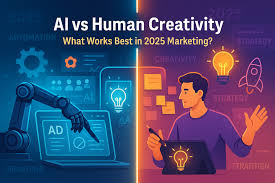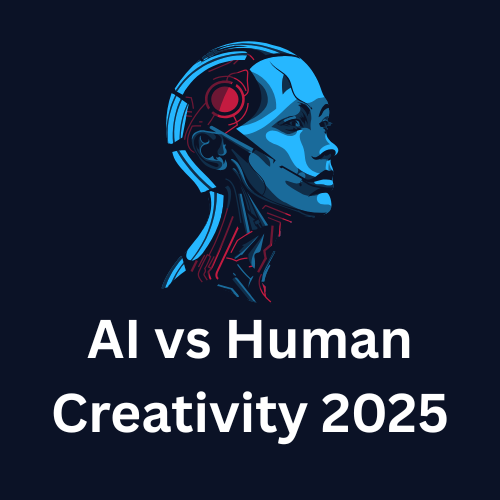AI vs Human Creativity
Consider this: In 2025, you find yourself in a busy New York art gallery. One wall has a beautiful abstract painting that was made by a human artist using their own heartbreak as inspiration. It swirls with colors that evoke raw emotion. Another piece across the room, created in a matter of seconds by an AI algorithm, shines with perfect symmetry and complex patterns. Which one makes you feel something? Which one is more “real” to you? This is not merely a hypothetical situation; rather, it is the current state of affairs regarding AI and human creativity.
A 2025 World Economic Forum report claims that AI investments in the creative industries have risen to $1.2 trillion, increasing productivity by 40% in industries like marketing and film. However, according to a Harvard Business Review survey, 75% of creatives think AI complements their work rather than takes its place.
The question of whether human ingenuity is irreplaceable or if machines can actually innovate is still up for debate as tools like ChatGPT develop into sophisticated collaborators. AI vs. human creativity impacts everyone, whether you’re a professional designer, a retiree writing memoirs, or a child drawing on an iPad. We’ll talk about strengths, conflicts, and synergies in this post, along with a dash of humor because, let’s be honest, it’s hilarious to think of robots writing Shakespeare. The creative revolution has arrived, so fasten your seatbelt!

Defining AI Creativity
To begin, let us clarify what we mean when we discuss AI creativity. It’s simple to imagine AI as a cold, calculating machine producing generic content in the conflict between AI and human creativity. However, in 2025, the inventiveness of artificial intelligence has developed into something much more complex. While AI generates based on patterns found in large datasets, it does not “create” in the human sense. Imagine it as an extremely intelligent remix artist who creates new forms out of preexisting concepts.
Tools like Midjourney and DALL-E 3 are powered by machine learning creativity, which transforms text prompts into visuals more quickly than you can say “inspiration struck.” Is this innovation, though? More augmentation than originality, according to experts. AI is capable of creating a Beethoven-style symphony, for example, but it is devoid of the emotional complexity of the composer’s personal hardships. This difference is crucial when comparing AI and human creativity: AI is more efficient, but humans contribute soul.
How AI Generates Content
Let’s examine the mechanics of AI versus human creativity in more detail. AI predicts and generates results using algorithms that have been trained on billions of data points. By 2025, generative AI, such as GPT-5, will be able to write scripts, poetry, and even brief bits of code. The idea that AI could write a love letter is amusing, but it’s unlikely to remember the peculiar inside jokes that give it a personal touch.
Pros of AI generation:
- Speed: Creates content in seconds.
- Scalability: Handles massive volumes effortlessly.
- Diversity: Pulls from global influences.
Yet, in AI vs human creativity debates, critics note AI’s reliance on human-input data—it’s creative recycling, not invention from scratch. For more on tools, check our best AI tools for 2025.
Essence of Human Creativity
Flip the coin now and compare human creativity with AI innovation. What inspires us to be creative? It’s that messy, erratic spark that draws from experiences, feelings, and even dreams. Despite the hype surrounding AI in 2025, humans are still the clear leaders in originality. We create for expression, connection, and change in addition to output.
AI cannot replace human creativity, which is fueled by empathy and intuition. Imagine a novelist incorporating personal trauma into a best-selling work; while AI may replicate the plot, it will not replicate the genuineness of the author’s heart. Despite the laughter, AI couldn’t read the atmosphere of the room and would fail at stand-up comedy.
Read more: AI vs Human Creativity in 2025: Who’s Winning the Innovation …
Unique Traits of Human Innovation
Humans are more creative than AI because they are more adaptive and emotionally intelligent. AI interprets whims, such as a child’s laughter or a rainy day, as data rather than emotions. According to studies, human-led projects encourage closer teamwork, which is crucial in creative industries.
Table of human strengths:
| Trait | Description | Example in 2025 |
|---|---|---|
| Emotion | Infuses work with feeling | Heartfelt songs topping charts |
| Originality | Breaks molds unpredictably | Indie films winning Oscars |
| Ethics | Considers moral implications | Sustainable design initiatives |
AI Strengths in Creativity
In the conflict between AI and human creativity, AI is the superpowered sidekick, not the antagonist. By 2025, speed, accuracy, and constant iteration will be AI’s strongest points. AI is used by marketing teams to create customized campaigns, producing thousands of variations in a single day. It’s funny that AI can come up with taglines that are funnier than the typical pun enthusiast.
AI-generated art has flourished, with tools producing images that are on par with professional artists. But when it comes to augmentation, AI outperforms humans in terms of creativity because it frees us from tedious tasks so we can concentrate on big ideas.
AI Tools Revolutionizing Fields
From writing to design, AI tools like Runway for video editing streamline processes. In film, AI predicts audience reactions, optimizing scripts. Our AI in marketing guide explores this further.
Bulleted AI advantages:
- Data-driven insights for better decisions.
- Cost-efficiency in prototyping.
- Accessibility for non-experts.
Human Advantages Over AI
Because of their indispensible attributes, humans outperform AI in terms of creativity. We contribute context, culture, and conscience. While AI may create a logo, humans make sure it is culturally appropriate and does not offend. In 2025, when AI overflows markets with content, human distinctiveness is highlighted.
The “creativity” of AI frequently produces amusingly off-target outputs, such as a poem about cats that sounds like a robot manual. AI cannot match human adaptability, ethical innovation, and interpersonal connections.
Emotional Depth in Creation
Human innovation draws from life experiences, creating works with soul. In AI vs human creativity, this edge persists in therapy, education, and art therapy. Link to our human creativity tips.

Case Studies: AI vs Human Creativity
AI vs Human Creativity battles in the real world are exciting. Consider the 2025 AtCoder World Tour, where a Polish programmer defeated OpenAI’s model in programming with scores of 1.91T to 1.55T, demonstrating that human creativity outperforms AI effectiveness.
Anderson Collaborative combines human storytelling for campaigns with AI for data in marketing. Movie? AI tools in Moon Valley improve the images, but the story is told by humans.
Synergy in AI vs Human Creativity
The real winner in AI vs human creativity? Collaboration. In 2025, hybrid approaches dominate—AI handles repetition, humans add flair. Think Pixar: AI aids animation, but storytellers craft magic.
Future of creativity in 2025 involves ethical AI use, ensuring humans lead.
Building Hybrid Creative Teams
Strategies include training on AI tools while nurturing human skills. Our collaboration guide dives in.
Future of AI vs Human Creativity
Peering into 2025 and beyond, AI vs human creativity evolves. Predictions: AI handles 60% of routine tasks, boosting human output by 30%. But concerns linger—will over-reliance dull human skills?
Innovative tech trends 2025 include AI ethics frameworks.
Predictions for 2030
Hybrid models prevail, with AI as enhancer.
Read more: AI vs Human Creativity in 2025, What is the Future of Art in an …
Conclusion
As we conclude our in-depth analysis of AI vs. human creativity in 2025, it is evident that neither “wins” by itself; rather, the magic occurs when both parties work together. AI revolutionizes everything from marketing to art by bringing speed and scale, while human ingenuity offers the moral and emotional center that machines cannot.
We’re on the verge of a creative boom that could boost economies by trillions of dollars, thanks to soaring investments and developing tools. But keep in mind that humans lead this dance. Adopting this synergy means more ideas, better stories, and limitless possibilities for people of all ages. The future is bright, regardless of whether AI inspires your next masterpiece or you defeat it in a coding competition.
Which would you prefer: a human team, a team AI team, or a team? Post your opinions in the comments section! Spread the word about this post and continue the discussion.
Read more: Top 10 Emerging Technologies in 2025 You Must Know
FAQs
Can AI replace human creativity in 2025?
No, AI augments rather than replaces human creativity. While it excels at generating content quickly, humans provide emotional depth and originality. In 2025, hybrid approaches in art and marketing show AI as a tool, not a substitute, per World Economic Forum insights.
How does AI impact artists’ jobs?
AI impacts jobs by automating routine tasks like drafting or editing, freeing artists for high-level work. A 2025 survey indicates 39% use AI, boosting productivity but requiring new skills. Human intuition remains key in fields like film and design.
What are examples of AI creativity?
Examples include AI-generated art via Midjourney or music from tools like AIVA. In 2025, AI creates personalized ads or scripts but lacks true innovation. Case studies show it enhances human efforts in marketing campaigns.
Is human creativity better than AI?
Human creativity edges out in emotion, ethics, and adaptability. AI vs human creativity debates highlight AI’s efficiency but humans’ ability to draw from personal experiences. 2025 trends favor collaboration for optimal results.
How to use AI for creative boost?
Use AI for brainstorming, like prompting ChatGPT for ideas or DALL-E for visuals. In 2025, integrate it into workflows for efficiency, but refine with human touch. This synergy amplifies output in writing, design, and more.


1 thought on “AI vs Human Creativity – Who Wins? Best in 2025”